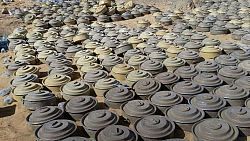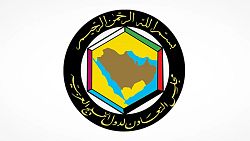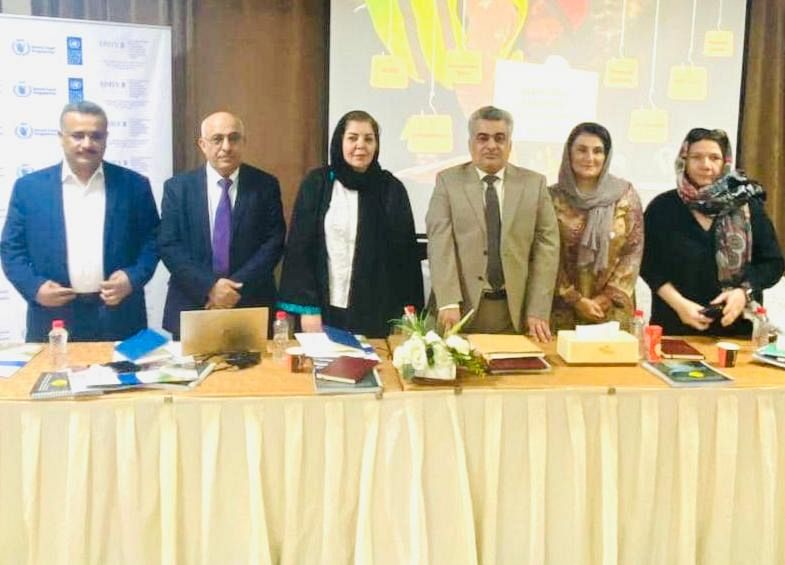
"MASAM" removes 1765 of Houthis-laid landmines in a week
King Salman Humanitarian Aid and Relief Center's Demining Project in Yemen, known as "MASAM" managed to remove 1,765 of landmines, unexploded ordnances (UXO) and improvised explosive devices (IED) in the last week February 2026.

Gulf Ministerial Council Condemns Iranian Attacks Targeting GCC States and Jorda
The 50th extraordinary session of the Ministerial Council of the Gulf Cooperation Council has strongly condemned and rejected the“criminal Iranian attacks” targeting GCC member states and the Hashemite Kingdom of Jordan.

Korea large companies' exports rise 10 percent
Large companies' exports in South Korea rose approximately 10 percent year-on-year in the fourth quarter of last year, driven by increased global demand for semiconductors.

Saudi League: Al-Nassr, Al-Ettifaq and Neom Secure Victories Over Al-Ittihad, Damac and Al-Riyadh
Al-Nassr defeated its guest Al-Ittihad 2–0 in the match that brought them together at Al-Awwal Park Stadium in Riyadh, as part of the 21st round of the Saudi Professional League.
Last Update: ،
2026/03/03
Time
02:49:30
Latest News:
 "MASAM" removes 1765 of Houthis-laid landmines in a week
"MASAM" removes 1765 of Houthis-laid landmines in a week
 Minister of Agriculture discusses with FAO agricultural, fishery development projects
Minister of Agriculture discusses with FAO agricultural, fishery development projects
 Prime Minister receives message from his Maltese counterpart
Prime Minister receives message from his Maltese counterpart
 Prime Minister: Efforts must be redoubled to improve public revenues
Prime Minister: Efforts must be redoubled to improve public revenues
 Local Administration Minister Discusses WFP Humanitarian Interventions
Local Administration Minister Discusses WFP Humanitarian Interventions
Latest News:
 "MASAM" removes 1765 of Houthis-laid landmines in a week
"MASAM" removes 1765 of Houthis-laid landmines in a week
 Minister of Agriculture discusses with FAO agricultural, fishery development projects
Minister of Agriculture discusses with FAO agricultural, fishery development projects
 Prime Minister receives message from his Maltese counterpart
Prime Minister receives message from his Maltese counterpart
 Prime Minister: Efforts must be redoubled to improve public revenues
Prime Minister: Efforts must be redoubled to improve public revenues
 Local Administration Minister Discusses WFP Humanitarian Interventions
Local Administration Minister Discusses WFP Humanitarian Interventions
Project Steering Committee for Livelihoods Support, Food Security held meeting
[28/02/2024 02:20]
ADEN-SABA
The Project Steering Committee for Livelihoods Support, Food Security, and Climate Adaptation in Yemen (Phase III) held its meeting here on Wednesday.
The meeting was chaired by Deputy Minister of Planning and International Cooperation Dr. Nizar Basuhayb to discuss the implementation of the project funded by the European Union and implemented by the Swedish International Development Cooperation Agency (SIDA) with the support from the United Nations agencies.
Dr. Basuhayb emphasized the importance of the project as one of the economic empowerment initiatives that contribute to improving food security, supporting small farmers, reducing malnutrition, mitigating climate change risks, and serving as a distinguished model for livelihood projects and employment opportunities for farmers.
He also highlighted the project's role in increasing agricultural productivity, empowering youth and women to own agricultural assets, and enhancing technical and vocational skills in rural areas.
Furthermore, Dr. Basuhayb reaffirmed the government's commitment to addressing the economic and livelihood conditions, providing basic services and supporting the agricultural and fisheries sectors in partnership with donors and Yemen's development partners.
He discussed the structural and emerging challenges facing development in Yemen in general, and the agricultural sector in particular, such as water resource scarcity, low agricultural productivity, heavy reliance on food imports (up to 90%), the impact of war and conflict, and Yemen's vulnerability to climate change.
He commended the level of strategic partnership with the European Union and its significant contributions in supporting Yemen in various vital areas, particularly livelihoods, agriculture, food security, women's empowerment, human rights and sustainable peace.
He stressed that the Ministry of Planning prioritizes the agricultural sector and food security in mobilizing external funding to contribute to reducing food insecurity and alleviating the humanitarian crisis affecting 80% of the population. He also highlighted that the agricultural sector contributes for around 20% of the gross domestic product and employs over 60% of the workforce.
For her part, Nadia al-Awamleh, the Deputy Resident Representative of the United Nations Development Program (UNDP), emphasized the economic and social importance of the project and the efforts of UNDP in supporting development in Yemen and transferring from relief to development.
The Project Steering Committee for Livelihoods Support, Food Security, and Climate Adaptation in Yemen (Phase III) held its meeting here on Wednesday.
The meeting was chaired by Deputy Minister of Planning and International Cooperation Dr. Nizar Basuhayb to discuss the implementation of the project funded by the European Union and implemented by the Swedish International Development Cooperation Agency (SIDA) with the support from the United Nations agencies.
Dr. Basuhayb emphasized the importance of the project as one of the economic empowerment initiatives that contribute to improving food security, supporting small farmers, reducing malnutrition, mitigating climate change risks, and serving as a distinguished model for livelihood projects and employment opportunities for farmers.
He also highlighted the project's role in increasing agricultural productivity, empowering youth and women to own agricultural assets, and enhancing technical and vocational skills in rural areas.
Furthermore, Dr. Basuhayb reaffirmed the government's commitment to addressing the economic and livelihood conditions, providing basic services and supporting the agricultural and fisheries sectors in partnership with donors and Yemen's development partners.
He discussed the structural and emerging challenges facing development in Yemen in general, and the agricultural sector in particular, such as water resource scarcity, low agricultural productivity, heavy reliance on food imports (up to 90%), the impact of war and conflict, and Yemen's vulnerability to climate change.
He commended the level of strategic partnership with the European Union and its significant contributions in supporting Yemen in various vital areas, particularly livelihoods, agriculture, food security, women's empowerment, human rights and sustainable peace.
He stressed that the Ministry of Planning prioritizes the agricultural sector and food security in mobilizing external funding to contribute to reducing food insecurity and alleviating the humanitarian crisis affecting 80% of the population. He also highlighted that the agricultural sector contributes for around 20% of the gross domestic product and employs over 60% of the workforce.
For her part, Nadia al-Awamleh, the Deputy Resident Representative of the United Nations Development Program (UNDP), emphasized the economic and social importance of the project and the efforts of UNDP in supporting development in Yemen and transferring from relief to development.
Key words:
Furthermore - implementation - Representative - International - contributions - vulnerability - distinguished - opportunities - government's - productivity - Yemen participates in Global Ministerial Conference on Tourism in Berlin
Yemen participates in Global Ministerial Conference on Tourism in Berlin "MASAM" removes 1765 of Houthis-laid landmines in a week
"MASAM" removes 1765 of Houthis-laid landmines in a week Minister of Agriculture discusses with FAO agricultural, fishery development projects
Minister of Agriculture discusses with FAO agricultural, fishery development projects  Prime Minister receives message from his Maltese counterpart
Prime Minister receives message from his Maltese counterpart Prime Minister: Efforts must be redoubled to improve public revenues
Prime Minister: Efforts must be redoubled to improve public revenues Local Administration Minister Discusses WFP Humanitarian Interventions
Local Administration Minister Discusses WFP Humanitarian Interventions Planning Minister Discusses Intervention Plans and Future Cooperation with UNDP
Planning Minister Discusses Intervention Plans and Future Cooperation with UNDP Yemen Announces Full Support for Statement Issued by GCC Ministerial Meeting
Yemen Announces Full Support for Statement Issued by GCC Ministerial Meeting Marib Deputy Governor Discusses Humanitarian Interventions with Turkish Associations
Marib Deputy Governor Discusses Humanitarian Interventions with Turkish Associations  Cabinet approves draft budget for fiscal year 2026
Cabinet approves draft budget for fiscal year 2026


